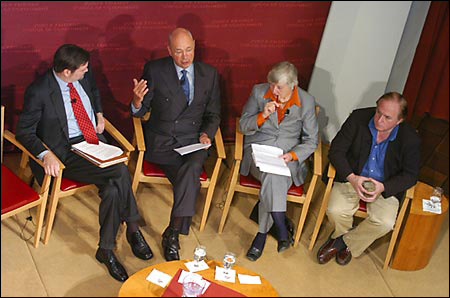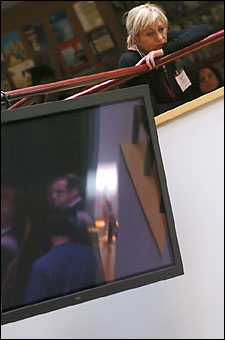Emerging democracies and transitions they face explored
KSG conference focuses on challenges ahead

What are the challenges facing emerging democracies? That’s the complex question asked, and partially answered, by a panel of Kennedy School professors on May 13 as part of the 2005 Kennedy School Spring Conference.
Moderator Frederick Schauer, the Frank Stanton Professor of the First Amendment, began to define the topic by pointing out that it encompasses the “noneconomic side of international development and governmental transformation.” The creation of democratic institutions in an emerging democracy, Schauer explained, cannot be thought of as serving only economic goals.

“We need to think about the institutional dimensions of creating the processes of elections, the institutional dimensions of the fostering and protection of human rights, the institutional dimensions of creating civil societies,” he said. “These noneconomic features can help with other development.”
Merilee Grindle, a professor of international development whose recent research has focused on Latin America, said that the honeymoon is over for citizens of Latin American countries who embraced democracy 15 to 25 years ago.
“Democracy is perceived as not having delivered what was promised,” Grindle explained. “Scholars, NGOs, democracy movements, politicians, and others really have oversold what can be expected from democracy and have raised expectations about what a form of government actually can achieve. Certainly, a democratic regime can deliver, in time, on promises for personal freedom and liberty, for participation in the decisions of government, and on equality of rights. But democracy has also been sold as a way to engender economic growth, as a way to achieve economic and social equality … democracy is not a panacea for economic development.”
Anthony Saich, professor of international affairs and faculty chair of Asia Programs, also stressed the dual challenge of pursuing economic development while building democratic institutions.
“This is the case for many countries in Africa, and for Afghanistan and Iraq,” Saich said. “If you look at the successful transitions in east Asia, such as South Korea and Taiwan, we see that economic reform actually preceded democratization. Whereas if you look at a country like the Philippines – which has struggled much more in this process – democratization preceded economic reform. So there are some interesting questions of sequencing in this dual transition.”
Shauer closed the discussion by returning to definitions. “How do we define democracy?” he asked. “It may be that, putting aside who votes, putting aside how they vote, or whether they have written constitutions, democracy is the system in which, by definition, the losers know how to lose. In that sense, when the losers think about the next transition, rather than taking to the streets or to the tanks, it may be that adaptability is what defines democracy.”




